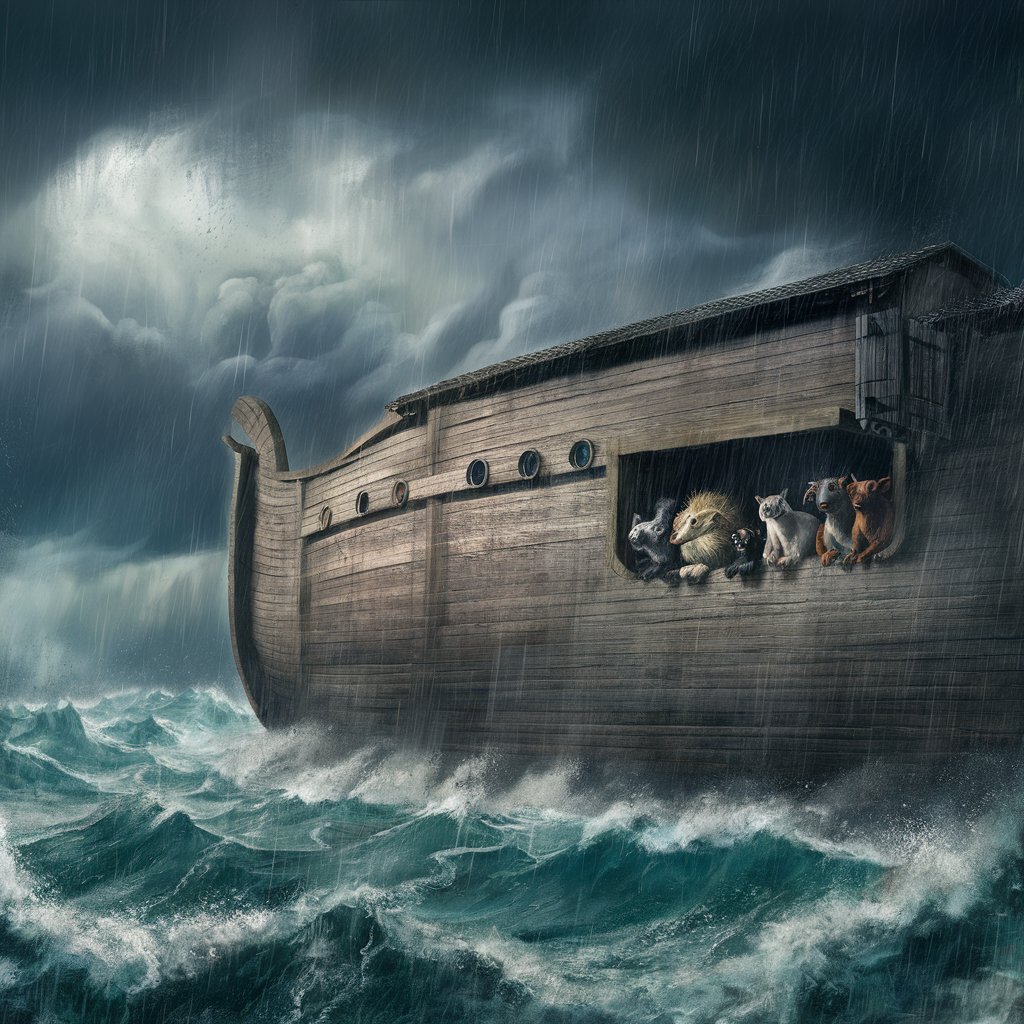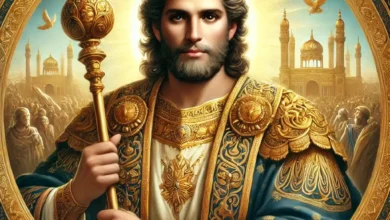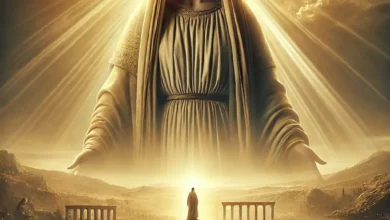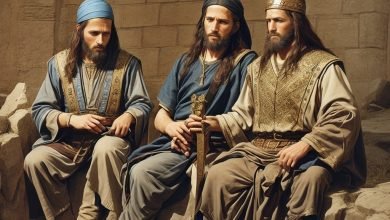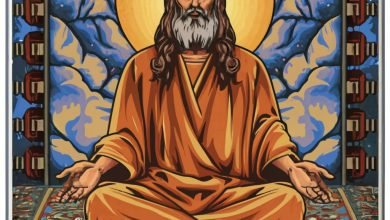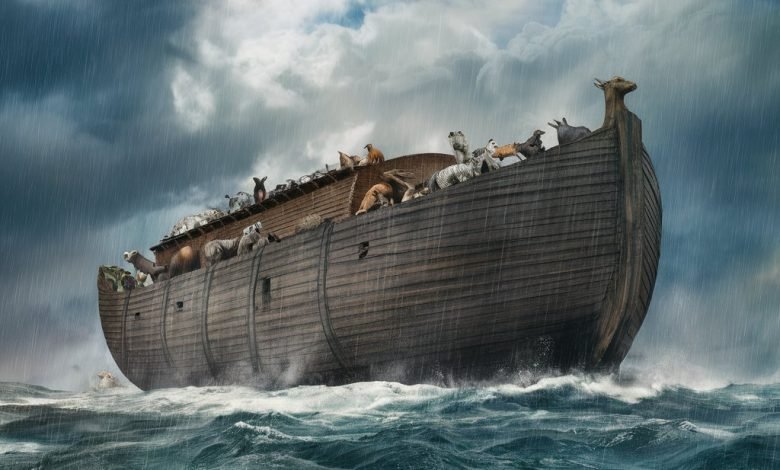
Noah in the Bible: Significance and Symbolism
Noah in the Bible was a faithful servant of God in a sinful world. He is best known for building an ark that saved him, his family, and pairs of all land animals from the great flood God sent to judge the earth. Noah, an obedient servant of God in the Old Testament, found favor with God despite the sinful world around him. He is most known for constructing an ark that saved him, his family, and pairs of all land animals from the flood God sent as judgment on the earth.
فرست محتوا
Meaning of the Name Noah
The name Noah means “rest” or “comfort.” This name is derived from the Hebrew word “Noach,” which means “to rest” or “to comfort.” Given Noah’s story, these meanings might seem unusual. After all, God flooded the earth, which doesn’t seem to bring rest or comfort to its inhabitants. However, the name might remind us of the peace Noah’s family felt when the floodwaters finally receded and God comforted them with a rainbow, promising never to flood the entire earth again.
Read More: Who Was Abel in the Bible and Why Did His Brother Kill Him?
The Story of Noah
When God saw how wicked and corrupt humanity had become, He regretted creating them and decided to destroy all mankind (Genesis 6:7). However, because He found Noah righteous, He showed him favor (Genesis 6:8).
God commanded Noah to build an ark to save himself, his family, and pairs of every kind of land animal from the impending flood (Genesis 6:14-21).
Rain fell, and floodwaters covered the earth for 40 days, but Noah and the ark’s inhabitants remained safe (Genesis 7:17-18).
After a dove sent by Noah returned with an olive leaf (Genesis 8:11), the flood’s survivors disembarked, and God blessed Noah and his sons, commanding them to be fruitful and multiply (Genesis 9:1). He also instructed them not to eat meat with lifeblood still in it (Genesis 9:4) and not to shed human blood (Genesis 9:5-6).
Furthermore, God established a covenant with Noah and his sons, promising never again to destroy all life with a flood (Genesis 9:9-11). As a sign of this covenant, God placed a rainbow in the clouds to remind all living creatures of His promise (Genesis 9:12-17).
Additional Information on Noah in the Bible
Noah is first mentioned in the Bible when his father, Lamech, prophesies Noah’s future role in relieving the earth’s curse: “He will comfort us in the labor and painful toil of our hands caused by the ground the Lord has cursed” (Genesis 5:29).
Noah’s unwavering faith and godly fear led him to build an ark when God warned him about the flood, even though he had never seen one before: “By faith Noah, when warned about things not yet seen, in holy fear built an ark to save his family. By his faith, he condemned the world and became heir of the righteousness that is in keeping with faith” (Hebrews 11:7).
In the book of Ezekiel, Noah is mentioned alongside Job and Daniel as one of three righteous men: “As surely as I live, declares the Sovereign Lord, even if Noah, Daniel, and Job were in it, they could save neither son nor daughter. They would save only themselves by their righteousness” (Ezekiel 14:20).
Interesting Facts About Noah
Noah was the tenth generation from Adam. His grandfather, Methuselah, was the oldest person mentioned in the Bible, living 969 years (Genesis 5:27). Some say Methuselah died in the flood, but he most likely passed away just before it occurred. We don’t have enough information from the Bible to be certain.
Noah fathered his sons Japheth, Shem, and Ham at 500 years old. He was 600 years old when the flood came (Genesis 7:6).
After stepping on dry ground post-flood, Noah’s first act was building an altar to God (Genesis 8:20).
Noah was the first person to plant a vineyard after the flood and also the first person mentioned in the Bible to get drunk (Genesis 9:20-21).
When Ham, Noah’s youngest son, found his father drunk and naked in his tent, instead of covering him, he told his brothers. For this sin, Noah cursed Ham’s son, Canaan, to be the lowest of servants to his brothers (Genesis 9:22-26).
Noah lived 350 years after the flood and died at the age of 950.
Symbols in the Bible Story of Noah
- The Raven (Genesis 8:7) and the Dove (Genesis 8:8-12): The dove often symbolizes peace in the Bible. Ravens, later in the Bible, fed a prophet. These birds likely represent future peace and God’s provision.
- The Ark (Genesis 6:14-16): The ark served as a home and refuge for God’s people when He flooded the earth. A similar use of the word “ark” is seen in Moses’ story when his mother placed him in a basket of reeds on the Nile, protecting him from dangerous creatures like hippos until he reached Pharaoh’s daughter.
- The Mountain (Genesis 8:4): Throughout the Bible, mountains symbolize various things like places of worship, life’s peaks (successes), and the site of Jesus’ transfiguration. Here, the mountain signifies God’s continued presence with Noah and a symbol of hope as the floodwaters recede.
- The Number 40 (Genesis 7:17): This number often symbolizes completeness or entirety in the Bible. We see this in Jesus fasting for 40 days and nights in the desert and the Israelites wandering for 40 years in the wilderness due to their disobedience until they could enter the Promised Land.
- The Rainbow (Genesis 9:13-17): The Bible refers to God placing His “bow” in the sky. Looking at a rainbow, it resembles a bent bow. While its meaning has evolved in modern culture, in the Bible, the rainbow symbolizes God’s promise never to flood the earth again. Before the flood, rain had not fallen on the earth, making this the first time people saw a rainbow.
Lessons from Noah’s Ark Story
Noah’s family consisted of eight members: Noah, his wife, three sons, and their wives. As the only human survivors of the flood, they became the founders of a new generation of humanity, leading to our salvation through Jesus Christ.
The events leading up to the flood can be seen as a foreshadowing of Christ’s return (Matthew 24:37-39).
Some lessons we can learn from this story are that God can provide a way of salvation. People had the opportunity to repent and board Noah’s ark, but they refused. This part of the Bible also shows God’s faithfulness. He didn’t abandon Noah’s family in the floodwaters. Instead, the waters eventually receded, and they found dry land again.



